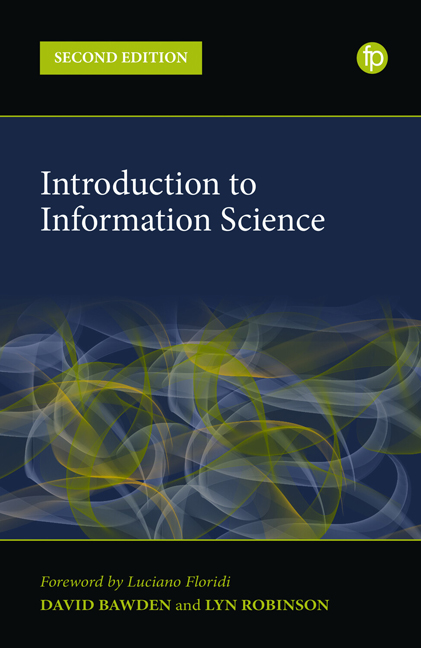Book contents
- Frontmatter
- Contents
- Figures
- Preface
- Foreword – Curators of Semantic Capital
- List of Acronyms
- 1 The Information Science Discipline
- 2 History of Information: the Story of Documents
- 3 Philosophies of Information
- 4 Paradigms, Turns and Theories in the Information Sciences
- 5 Information
- 6 Documents and Documentation
- 7 Domain Analysis
- 8 Information Organisation
- 9 Digital Technologies and Data Systems
- 10 Information Systems
- 11 Informetrics
- 12 Information Behaviour
- 13 Communicating Information: Changing Contexts
- 14 Information Management and Policy
- 15 Information Law and Ethics
- 16 Information Society
- 17 Digital (Onlife) Literacies
- 18 Research in the Information Sciences
- 19 The Future of the Information Sciences
- Additional Resources
- Index
15 - Information Law and Ethics
Published online by Cambridge University Press: 21 April 2022
- Frontmatter
- Contents
- Figures
- Preface
- Foreword – Curators of Semantic Capital
- List of Acronyms
- 1 The Information Science Discipline
- 2 History of Information: the Story of Documents
- 3 Philosophies of Information
- 4 Paradigms, Turns and Theories in the Information Sciences
- 5 Information
- 6 Documents and Documentation
- 7 Domain Analysis
- 8 Information Organisation
- 9 Digital Technologies and Data Systems
- 10 Information Systems
- 11 Informetrics
- 12 Information Behaviour
- 13 Communicating Information: Changing Contexts
- 14 Information Management and Policy
- 15 Information Law and Ethics
- 16 Information Society
- 17 Digital (Onlife) Literacies
- 18 Research in the Information Sciences
- 19 The Future of the Information Sciences
- Additional Resources
- Index
Summary
The task is to formulate an ethical framework that can treat the infosphere as a new environment worthy of the moral attention and care of the human inforgs inhabiting it. Such an ethical framework must address and solve the unprecedented challenges arising in the new environment.
Luciano Floridi (2014, 219)Ethical issues involving data may be more challenging than the ethical challenges of some other advanced technologies, partly because data and data science are so ubiquitous, having the potential to impact all aspects of life, and partly because of their intrinsic complexity … We must also recognize that we cannot expect to give simple answers to complex moral problems involving data. This will often be impossible, not least because the data environment is changing so rapidly. Instead, the aim must be to help focus on the issues and attempt to remove confusion and ambiguity, so as to provide principles that can help people come to a conclusion about what is the right way to act and the right thing to do in the circumstances in which they find themselves.
David J. Hand (2018, 176)Information law issues dovetail together, creating a sophisticated, complex and delicate balance between facilitating open and free access to information – thus supporting open and accountable government, democratic freedom, and an uncensored press – simultaneously with the necessity for control and privacy. This balance is not always successfully achieved …
Charles Oppenheim, Adrienne Muir and Naomi Korn (2020, xv)Introduction
In this chapter we examine the law and ethics of information. This is a broad topic and we can give only an overview with some relevant examples. In par - ticular, the sections on information law are not in any way intended to provide legal advice. Examples are largely chosen from UK law as of 2021 and may not be relevant at other times, or in other jurisdictions. Ethical issues for specific aspects of information science are dealt with in the appropriate chapters.
The chapter is organised into four sections. After a discussion of the context, and how law, ethics, governance, regulation, standards, etc. interact, the following two sections deal with the generalities of information law and of information ethics. The fourth section examines the legal and ethical aspects of two topics, privacy and artificial intelligence, to illustrate general principles with specific examples.
- Type
- Chapter
- Information
- Introduction to Information Science , pp. 295 - 316Publisher: FacetPrint publication year: 2022



